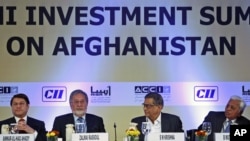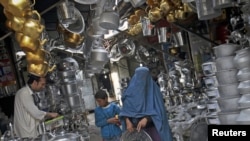NEW DELHI - India is encouraging private investors to take advantage of growing opportunities in Afghanistan and help stabilize the war-torn country. But security concerns remain deterrents for many businessmen.
At a conference in New Delhi Thursday, Indian Foreign Minister S.M. Krishna told foreign and domestic business representatives the withdrawal of international combat forces from Afghanistan by 2014 should not result in a political or security vacuum that will be filled by extremists.
“We feel that foreign investment and domestic private sector development, both small and large scale can play that role," said Krishna. "Let the grey suits of company executives take the place of olive green or desert brown fatigues of soldiers; and CEO’s, the place of generals.”
The Delhi Investment Summit on Afghanistan was hosted by the Confederation of Indian Industry. The conference attracted over 200 private companies from several countries including those from China, the United States, and Pakistan.
Foreign Minister Krishna admitted that Afghanistan may not be the easiest destination to sell to a business owner, but India is venturing to attract investment.
As part of its policy to expand its economic presence in Afghanistan, India is also encouraging its vast private sector to collaborate on business opportunities with Afghan partners.
The Indian government has committed $2 billion of investment, and several public and private Indian companies are bidding for projects in sectors ranging from mining to health and construction. However security concerns and poor infrastructure remain key challenges.
Five senior Afghan ministers attended the conference to woo businesses and promote Afghanistan as a low tariff and business-friendly destination.
Afghan Commerce and Industry Minister, Anwar-ul-Haq Ahady, said opportunities in sectors ranging from mining to agro-based businesses could offset any perceived security risks.
“The flip side of the exaggerated perception of the insecurity risk involved in doing business in Afghanistan is that there are a wide range of highly profitable investment opportunities that have yet to be taken up. And I believe that even when we take into account the high level of risk, the return on investment there is greater than in most parts of the world,” Ahady said.
Afghan officials said they are hoping for greater investment from Asian companies, who may find it easier to understand Afghanistan's culture and the business climate.
As some business representatives express hesitation on entering a country at a time when international combat forces are pulling out, some are more optimistic about the security challenges.
Surender Makhija of Jain Irrigation Systems in New Delhi has been training farmers in Afghanistan for several years. He is preparing to visit Kabul next week, and says the situation is sometimes not as bad as it is perceived to be.
“Anybody told to go to Afghanistan he just kind of feels scared about terrorism and all that, but I don’t think it is that bad, it is more of apprehension,” Makhija said.
Afghan officials meanwhile stressed that private sector investment would be key in making the country self-reliant and eventually lead to greater stability in the region as a whole.
At a conference in New Delhi Thursday, Indian Foreign Minister S.M. Krishna told foreign and domestic business representatives the withdrawal of international combat forces from Afghanistan by 2014 should not result in a political or security vacuum that will be filled by extremists.
“We feel that foreign investment and domestic private sector development, both small and large scale can play that role," said Krishna. "Let the grey suits of company executives take the place of olive green or desert brown fatigues of soldiers; and CEO’s, the place of generals.”
The Delhi Investment Summit on Afghanistan was hosted by the Confederation of Indian Industry. The conference attracted over 200 private companies from several countries including those from China, the United States, and Pakistan.
Foreign Minister Krishna admitted that Afghanistan may not be the easiest destination to sell to a business owner, but India is venturing to attract investment.
As part of its policy to expand its economic presence in Afghanistan, India is also encouraging its vast private sector to collaborate on business opportunities with Afghan partners.
The Indian government has committed $2 billion of investment, and several public and private Indian companies are bidding for projects in sectors ranging from mining to health and construction. However security concerns and poor infrastructure remain key challenges.
Five senior Afghan ministers attended the conference to woo businesses and promote Afghanistan as a low tariff and business-friendly destination.
Afghan Commerce and Industry Minister, Anwar-ul-Haq Ahady, said opportunities in sectors ranging from mining to agro-based businesses could offset any perceived security risks.
“The flip side of the exaggerated perception of the insecurity risk involved in doing business in Afghanistan is that there are a wide range of highly profitable investment opportunities that have yet to be taken up. And I believe that even when we take into account the high level of risk, the return on investment there is greater than in most parts of the world,” Ahady said.
Afghan officials said they are hoping for greater investment from Asian companies, who may find it easier to understand Afghanistan's culture and the business climate.
As some business representatives express hesitation on entering a country at a time when international combat forces are pulling out, some are more optimistic about the security challenges.
Surender Makhija of Jain Irrigation Systems in New Delhi has been training farmers in Afghanistan for several years. He is preparing to visit Kabul next week, and says the situation is sometimes not as bad as it is perceived to be.
“Anybody told to go to Afghanistan he just kind of feels scared about terrorism and all that, but I don’t think it is that bad, it is more of apprehension,” Makhija said.
Afghan officials meanwhile stressed that private sector investment would be key in making the country self-reliant and eventually lead to greater stability in the region as a whole.







